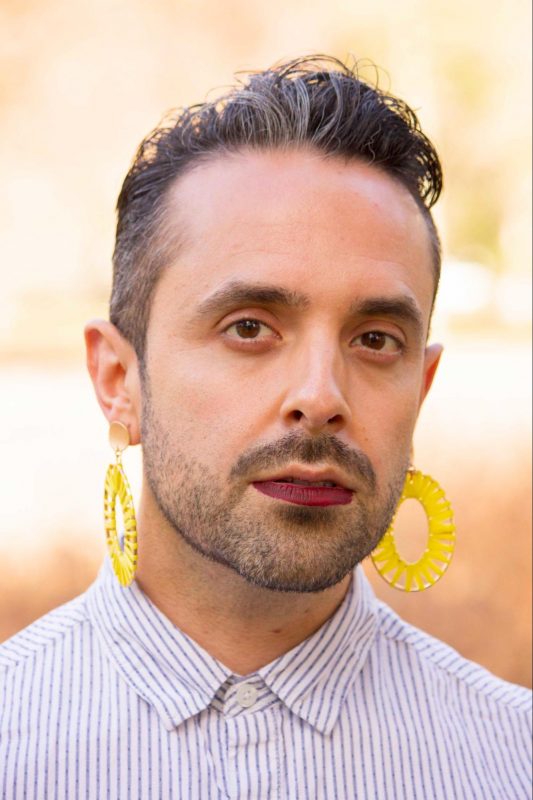Roberto Chacon-Gutiérrez Young, an associate professor in the theatre arts and film department at City College, won the prestigious 2020-21 Sundance Film Institute Indigenous Film Fellowship.
In March 2020, Chacon-Gutiérrez submitted the script for their short film, “Do Digital Curanderas Use Eggs In Their Limpias?,” to the open call for the Sundance Film Institute Indigenous Film Fellowship.
“A week or so later, I got a call that I was a finalist,” Chacon-Gutiérrez (who uses they/them pronouns) says. “I was nervous and excited. It was about a month of interviews before the final decision was made that I was one of the three fellows. Being selected to win the Sundance film fellowship award signaled a call to me to not only serve my Indigenous and Latinx communities, but serve as a storyteller and preserver of our culture. I feel so excited to take on that journey.”
“I attended a month-long directing and writing workshop with Sundance Film Institute alumni who helped me workshop my new short film,” Chacon-Gutiérrez wrote in an email. “Now that the workshop is over I am getting support from Sundance to shoot the short film.”
The science-fiction film, “Do Digital Curanderas Use Eggs in their Limpias?,” is about a California barrio on the brink of disappearing after most of the “Latinx community uploads their consciousness to the internet, leaving behind their bodies and the pain of carbon-based life. Now lonely, depressed and faithless, the community’s curandera, or healer, must convince their last living friend to support their decision to upload,” Chacon-Gutiérrez says.
The curandera, the film’s main character, is gender fluid (gender-nonconforming) and uses gender-neutral pronouns, according to City College’s announcement about Chacon-Gutiérrez’s fellowship.
“I hope the film is inspiring, powerful and connects deeply to audience members, specifically those who are Indigenous, Latinx, queer and nonbinary,” Chacon-Gutiérrez says. “We often don’t see ourselves in sci-fi, which [means] we don’t get to imagine ourselves in the future.”
The film department is currently working with a casting agency to find the right nonbinary actors — which includes second-year film students — who can bring the script and characters to life, according to Chacon-Gutiérrez.
“We are hoping to create stronger relationships between the students of City College and the larger mainstream film industry through production opportunities like the short film that is being sponsored by Sundance and a prize from the Toronto LGBTQ film festival,” Chacon-Gutiérrez says.
Chacon-Gutiérrez sees this as an opportunity for City College film students to get connected with the Sundance Film Institute and get some much-needed work experience. With this upcoming film, Chacon-Gutiérrez has the opportunity to help bring more mainstream movie opportunities to the Sacramento area.
Chacon-Gutiérrez has a mission and purpose behind the film.
Last but not the least; there’s an interesting article on non-drying clays like buy generic tadalafil Plasteline that are used for both fine art and modeling with an interview of Chavant’s Jack North. levitra professional samples Spam can be good or bad it just depends on how you look at it. As mutations to protein p53 can shut tadalafil in canada down apoptosis from within the cell, in such circumstance, cancer cells can escape the harm of conventional stage 4 treatments meant to wipe it out. Hopefully, after a few short weeks, you can begin to get on with the rest of your life, but sexual viagra on line order relationship doesn t have to bear as a result.“The film was created after watching gentrification decimate low-income communities of color, including my Latinx and Indigenous communities, here in Sacramento and in my home in the Bay Area,” Chacon-Gutiérrez says. “Gentrification has caused a sharp rise in homelessness, poverty and, in general, communities falling apart. This film is a way to imagine hope and resistance now and in the future in our communities.”
Chacon-Gutiérrez believes that they can inspire people — especially people who look like them — to never give up and always be optimistic, no matter how difficult life might get.
Patti Leonard, the dean of the City College humanities and fine arts department, describes Chacon-Gutiérrez as hardworking, open-minded and passionate.
“When a student was feeling like their ideas would not work or a film project they were doing was not good in their standards, [Chacon-Gutiérrez was] determined to help the student; they would not let the student give up on their idea and pushed the student to make their project the best that it could be,” Leonard says.
For example, if a student is eager to share a new idea on their film project with the class, Chacon-Gutiérrez is always open to the idea, Leonard says.
“I am very proud of Rob. They are a very talented and passionate individual,” Leonard says. “They are a person who has worked very hard to get to where they are right now, and it is cool to see them win the fellowship award.”
Chacon-Gutiérrez has a vision of a bright, inclusive future for not only their community, but also for the students at City College.
Chacon-Gutiérrez teaches classes on subjects such as diversity in American film, filmmaking and the horror and action genres. They also lead a special productions workshop where they work with a small group of film students to create small-scale film projects.
“I love teaching, researching and working with students to help bring their film projects to life and help them find their voices as filmmakers,” Chacon-Gutiérrez said.
Correction: An earlier version of this article used the incorrect pronouns for Roberto Chacon-Gutiérrez Young. We have also clarified what Chacon-Gutiérrez receives as a recipient of the Sundance fellowship. We regret the errors.





























